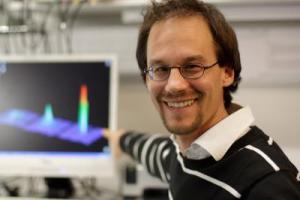Nov 26 2013
This year the European Research Council (ERC) awards the very first ERC Consolidator Grants for promising researchers with seven to twelve years research experience. Florian Schreck has received this grant for his concepts to study quantum many-body systems.
 This is physicist Florian Schreck.Credit: IQOQI
This is physicist Florian Schreck.Credit: IQOQI
In June another physicist, Oriol Romero-Isart who has just started working in Innsbruck, also received a highly valued ERC grant: the ERC Starting Grant. "We are very excited about these awards," says the Director of the IQOQI Rudolf Grimm. "Florian Schreck has achieved outstanding research results in Innsbruck. This ERC grant and the professorship in Amsterdam offer him the best opportunities to successfully carry on with his research. The fact that our researchers are highly sought after internationally and are awarded with the most highly prized international awards and grants, is once again a notable recognition for physics research in Innsbruck."
Deep view into the quantum world
Ensembles consisting of many particles show behavior that cannot be deduced simply from equations describing each individual particle. "In fact, in many-body quantum physics classical computers cannot achieve this at all in most cases," explains Florian Schreck. "That is why we need to understand these systems experimentally." For example, in a laboratory, physicists are able to mimic simple theoretical models of solid body physics with ultracold quantum gases. "We can do this because all system parameters are well controlled and because we have sophisticated measurement methods," says Schreck. The experimental physicist works with quantum gases consisting of strontium atoms. In 2009 his research team in Innsbruck produced the first strontium Bose-Einstein condensate worldwide; and in 2012 Schreck and his team were able to produce a strontium Bose-Einstein condensate using only laser cooling. This successful research work has been recognized internationally and is also the basis for his research planned with the ERC Consolidator Grant funds.
New possibilities
The alkaline-earth element strontium, used by Florian Schreck, has two electrons in its outer shell while the majority of other quantum gas experiments use simpler alkaline atoms that have only one electron in the outer shell. The two outer shell electrons in strontium have many useful properties such as broad and narrow optical transitions and metastable states, which allow the investigation of completely new phenomena. Florian Schreck and his team are particularly interested in quantum magnetism and quantum Hall physics. Understanding these phenomena opens up new possibilities for precision measurement with atomic clocks, for example. "If we are able to better understand quantum physics of many-body systems, we may also be able to create new materials whose properties will be completely distinct from other known materials," says Florian Schreck with a view into the future. "Examples are new types of superconductors, new magnetic materials and robust quantum information storage devices."
About Florian Schreck
Florian Schreck (41) was born in Constance, Germany. He studied physics at the University of Constance and University of Grenoble. After he received a PhD in Paris and completed a two year research period in the USA, he started working with Prof. Rudolf Grimm's research group in Innsbruck in 2004. In 2010 he received the START Prize, the highest valued research award for junior researchers in Austria. Florian Schreck has been recruited as Professor for Experimental Quantum Physics at the Van der Waals-Zeeman Insitute for Experimental Physics at the University of Amsterdam. He is succeeding Prof. Jook Walraven, who is a pioneer in the field of quantum gases. Florian Schreck and his research group is moving the experimental setup to Amsterdam at the beginning of December and he is also taking his team from the IQOQI with him.